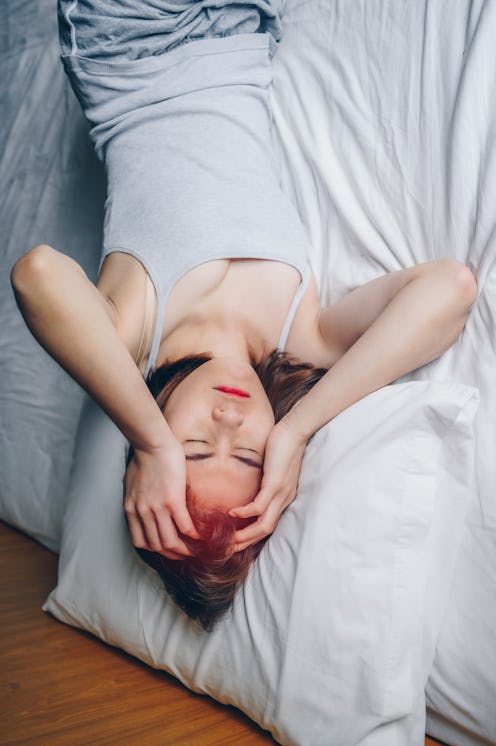Health
How A White Claw Hangover Is Different From A Beer Or Wine Hangover, According To Doctors
There might not be laws when you’re drinking Claws, but there are consequences.

It's happened to pretty much everyone. You have a few drinks and wake up the next day feeling like you've been hit by a bus. Hangovers are uniquely terrible, but are they all created equal? For example, the morning after a spiked seltzer-fueled darty might feel very different from a Wednesday morning when you had a glass of wine too many the night before. There are a few reasons a White Claw hangover feels different than a beer or wine hangover.
If you're not in the know about White Claw, this spiked sparkling water comes in a sleek can, is gluten-free, and it has pretty much dethroned rosé as the beverage synonymous with day drinking. What's more, some devotees claim White Claw doesn't give them a hangover. One 29-year-old told W Magazine, "I danced to early '00s hip-hop all night and didn't even have the slightest hangover [after drinking White Claw]."
Why White Claw Gives You A Hangover
White Claw and other spiked seltzers contain alcohol, and they're not magic. This means, like any alcoholic beverage, they can definitely give you a hangover if you drink enough. And that hangover — especially compared to a beer or wine hangover — might make your stomach feel like it's inhabited by aliens.
"With White Claw, you are seeing more day drinking, in part, because the product is keeping people more hydrated than traditional alcoholic beverages and is easier to conceal as a 'soft drink,'" Dr. Niket Sonpal, M.D., an NYC-based internist, gastroenterologist, and faculty member of Touro College of Medicine, tells Bustle.
"While hard seltzers tend to have lower alcohol levels than other alcohols, given their sugar load and sweet taste, people tend to drink them even more quickly and in greater number than other alcoholic beverages," Dr. Scott Braunstein M.D., medical director at Sollis Health, tells Bustle. "That can often lead to equally high, or higher blood alcohol levels." And that means a killer headache in the morning.
"As far as stomachaches, these can be caused by sweetened seltzers that often get their taste from sugar alcohols, which your gastrointestinal tract might have a tough time breaking down," Sonpal adds. Even though it may taste like carbonated water, hard seltzer is not something you want to chug. Because, as the Cleveland Clinic notes, the carbon dioxide bubbles in carbonated alcoholic beverages are absorbed more quickly into the bloodstream, which means they can make you impaired more quickly (not to mention contribute to that bloated and gassy feeling).
According to a 2011 study published in the journal Clinical Gastroenterology and Hepatology, excessive carbon dioxide in the system can potentially lead to "changes in intestinal transit and visceral sensation." And feeling bloated, experiencing acid reflux, or constantly burping after drinking sparkling beverages are signs you may have overloaded your stomach with gas and it's time to cool it with the carbonation.
How A White Claw Hangover Can Be Less Intense Than A Wine Or Liquor Hangover
On the other hand, because it doesn't contain congeners, a byproduct of the fermentation process that produces chemicals like acetone, acetaldehyde, and methanol, the hangover from White Claw could be less intense for some people, especially if they don't generally experience stomachaches.
"Hard seltzers have a very low concentration of congeners, which are thought to contribute to hangover symptoms," Braunstein says. "Certain alcohols, such as red wine, brandy, and whiskey, are known to contain much higher levels."
That said, everyone is different and what makes one person wake up feeling like a dishrag leaves another feeling fine. The alcohol by volume (ABV) per can of spiked seltzer hovers around 5%, which is roughly the same as beer. Wine, on the other hand, is usually about 10-15% ABV, Sonpal points out. This means if you drink the same amount of wine as you would hard seltzer, it should go without saying you're going to be a wreck the next day. But if you're sensitive to gluten, you may feel better the next day after drinking gluten-free hard seltzer than after drinking the same amount of beer.
The bottom line? The only way to prevent a hangover, White Claw, wine, or otherwise, is to moderate drinking, with lots of water between alcoholic beverages — no, spiked seltzer does not count as water — or total abstinence. "The severity of hangovers increases with the amount of alcohol you consume," Sonpal says. "For this reason, the best way to prevent hangovers is to drink in moderation."
So if it contains alcohol, a good rule of thumb is: Take it easy day drinking to dodge tomorrow's sorrow.
Experts
Dr. Scott Braunstein, M.D.
Dr. Niket Sonpal, M.D.
Studies referenced
Lacy, B. E., Gabbard, S. L., & Crowell, M. D. (2011). Pathophysiology, Evaluation, and Treatment of Bloating: Hope, Hype, or Hot Air?. Gastroenterology & Hepatology, 7(11), 729–739.
Rohsenow, D. J., & Howland, J. (2010). The role of beverage congeners in hangover and other residual effects of alcohol intoxication: a review. Current Drug Abuse Reviews, 3(2), 76–79. https://doi.org/10.2174/1874473711003020076
This article was originally published on